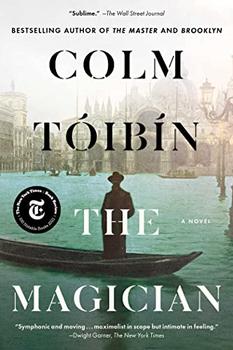Summary | Excerpt | Reading Guide | Reviews | Beyond the Book | Readalikes | Genres & Themes | Author Bio

A Novel
by Colm ToibinChapter 1
Lübeck, 1891
His mother waited upstairs while the servants took coats and scarves and hats from the guests. Until everyone had been ushered into the drawing room, Julia Mann remained in her bedroom. Thomas and his older brother Heinrich and their sisters Lula and Carla watched from the first landing. Soon, they knew, their mother would appear. Heinrich had to warn Carla to be quiet or they would be told to go to bed and they would miss the moment. Their baby brother Viktor was sleeping in an upper room.
With her hair pinned back severely and tied in a colored bow, Julia stepped out from her bedroom. Her dress was white, and her black shoes, ordered specially from Majorca, were simple like a dancer's shoes.
She joined the company with an air of reluctance, giving the impression that she had, just now, been alone with herself in a place more interesting than festive Lübeck.
On coming into the drawing room, having glanced around her, Julia would find among the guests one person, usually a man, someone unlikely such as Herr Kellinghusen, who was neither young nor old, or Franz Cadovius, his squint inherited from his mother, or Judge August Leverkühn, with his thin lips and clipped mustache, and this man would become the focus of her attention.
Her allure came from the atmosphere of foreignness and fragility that she exuded with such charm.
Yet there was kindness in her flashing eyes as she asked her guest about work and family and plans for the summer, and, speaking of the summer, she would wish to know about the relative comfort of various hotels in Travemünde, and then she would ask about grand hotels in places as distant as Trouville or Collioure or some resort on the Adriatic.
And soon she would pose an unsettling question. She would ask what her interlocutor thought about some normal and respectable woman within their group of associates. The suggestion was that this woman's private life was a matter of some controversy and speculation among the burghers of the town. Young Frau Stavenhitter, or Frau Mackenthun, or old Fraulein Distelmann. Or someone even more obscure and retiring. And when her bewildered guest would point out that he had nothing other than good to say of the woman, in fact had nothing beyond the very ordinary to transmit, Thomas's mother would express the view that the object of their discussion was, in her considered opinion, a marvelous person, simply delicious, and Lübeck was lucky to have such a woman among its citizens. She would say this as if it were a revelation, something that must stay quite confidential for the moment, something, indeed, that even her husband, the senator, had not yet been told.
The following day, news would spread about their mother's deportment and whom she had singled out for comment, until Heinrich and Thomas would hear about it from their school friends, as if it were a very modern play, fresh from Hamburg, that had been performed.
In the evenings, if the senator were at a meeting, or in the time when Thomas and Heinrich, having done their violin practice and eaten their supper, were in their nightclothes, their mother would tell them about the country of her birth, Brazil, a place so vast, she said, that no one knew how many people were there or what they were like or what languages they spoke, a country many, many times the size of Germany, where there was no winter, and never any frost or real cold, and where one river, the Amazon, was more than ten times longer than the Rhine and ten times as wide, with many smaller rivers flowing into it that reached back deep into the forest, with trees higher than trees anywhere else in the world, with people whom no one had ever seen or would see, since they knew the forest as no one else did, and they could hide if an intruder or an outsider came.
"Tell us about the stars," Heinrich would say.
Excerpted from The Magician by Colm Toibin. Copyright © 2021 by Colm Toibin. Excerpted by permission of Scribner. All rights reserved. No part of this excerpt may be reproduced or reprinted without permission in writing from the publisher.
Your guide toexceptional books
BookBrowse seeks out and recommends the best in contemporary fiction and nonfiction—books that not only engage and entertain but also deepen our understanding of ourselves and the world around us.